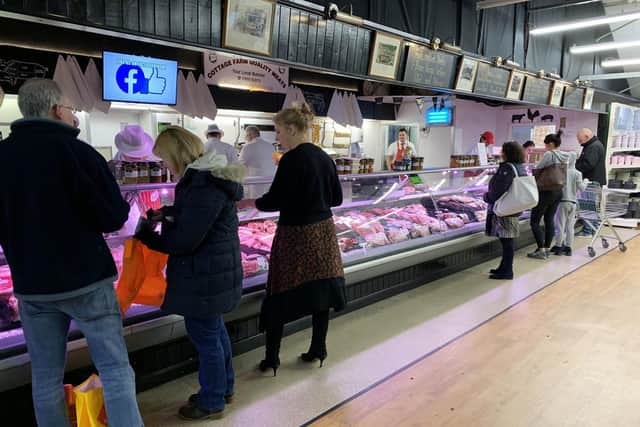Hurting farmers by allowing lower-quality produce into UK 'is not a Conservative thing to do', says Yorkshire peer Baroness McIntosh
and live on Freeview channel 276
Conservative Baroness McIntosh of Pickering made the claim as she lobbied for an amendment to the Government's Agriculture Bill, the legislation which will shape the future of farming after Brexit.
The former Thirsk and Malton MP tabled an amendment to ensure animal health, hygiene or welfare standards for agricultural products could not be lowered below established EU or UK standards.
Advertisement
Hide AdAdvertisement
Hide AdIt comes amid fears that the UK may be forced to accept the importing of food produced to lower standards as part of a free trade deal to lower tariffs with the US after the UK leaves the European Union.
In a debate in the House of Lords late on Thursday night, Lady McIntosh said she took "great heart" from the promise by a government Minister that "the Government will keep and raise our own environmental standards".
But she said: "What concerns me here is that we seem to be disadvantaging our own farmers and producers in two ways.
"One is that while we are keeping the same high standards that we currently have and possibly raising them even higher, we seem to be contemplating importing produce of lower standards in marketing, environmental health, animal welfare and hygiene.


Advertisement
Hide AdAdvertisement
Hide Ad"That to me is just not a Conservative thing to do; I cannot believe we are even contemplating it.
"That is why the thrust of my amendment is that the regulations within this clause cannot be used to make provisions that will have the effect of lowering animal health, hygiene or welfare standards for agricultural products below those established in the EU or the UK."
She added that mandatory labelling of food at the end of the Brexit transition period on December 31, "does not encourage people to eat home-produced meat".
She pointed to the Red Tractor scheme, the largest food assurance scheme in the UK which she said was meant to show people that meat was produced to high standards.
Advertisement
Hide AdAdvertisement
Hide AdShe said: "But that is not the basis on which people buy their food; they buy on price. It can have as pretty a red label as you like, but people will often still buy the cheapest cut of meat."
Lady McIntosh added: "The other issue with labelling is this. How am I, as a consumer eating out in a restaurant or other catering establishment, to know that what I am eating is from this country and meets the high standards that the Government have asked our own producers to meet?
"This could create a two-tier system and mean that only those who can afford the higher prices of our home-produced food would be able to buy it."
In the same debate, peers were accused of sneering at shoppers who choose to buy cheaper foods.
Advertisement
Hide AdAdvertisement
Hide AdConservative former minister Lord Lilley made the claim as he questioned if changes to food labelling would result in people buying food produced to a high standard instead of cheaper options.
He told a debate on the Agriculture Bill: "The sad truth is something less than two per cent of our poultry is organically labelled - or less than two per cent of what people buy - for pigs, it's less than one per cent, and for cattle, it's less than three per cent.
"In general, people seem to prefer the least expensive product as long as it's safe for them to eat.
"And that's perfectly reasonable - it's all right for members of your lordships' house to sneer at people buying on the basis of price, but a lot of people have to.
Advertisement
Hide AdAdvertisement
Hide Ad"Food is one of the biggest items of their budget and they want it to be available to them as cheaply as possible."
For the Government, Environment minister Lord Gardiner of Kimble said: "At the end of transition all EU food safety, animal welfare and environmental standards will be retained and form part of our domestic law.
"This includes all existing import requirements. Any changes to existing legislative standards would require new legislation to be brought before Parliament.
"The Government has absolutely no intention of watering down welfare standards and will continue to take action to improve these standards.
Advertisement
Hide AdAdvertisement
Hide Ad"We will not lower standards or put the UK's biosecurity at risk as we negotiate new trade deals.
"The Government is committed to improving animal welfare standards and will be consulting on improvements to the regulations on animal transportation later this year."